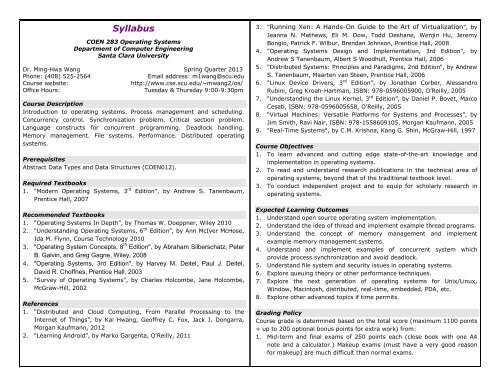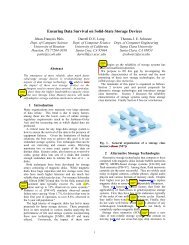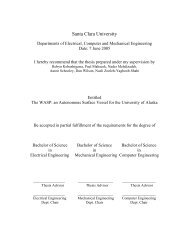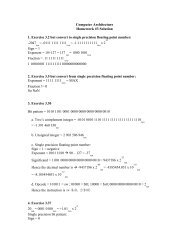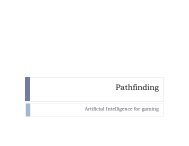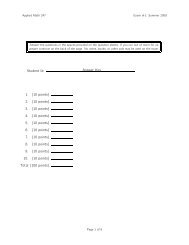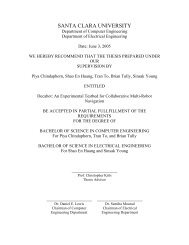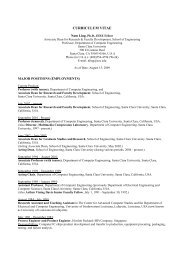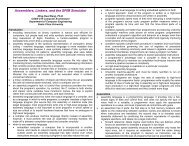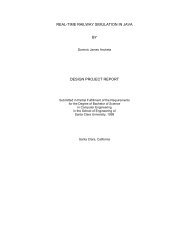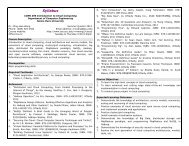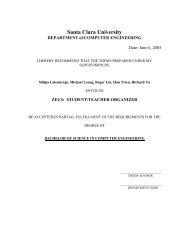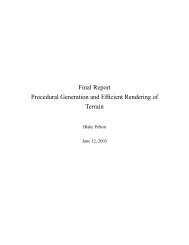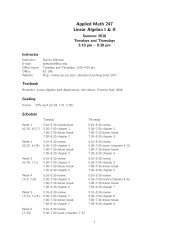Syllabus - Computer Engineering - Santa Clara University
Syllabus - Computer Engineering - Santa Clara University
Syllabus - Computer Engineering - Santa Clara University
You also want an ePaper? Increase the reach of your titles
YUMPU automatically turns print PDFs into web optimized ePapers that Google loves.
<strong>Syllabus</strong><br />
COEN 283 Operating Systems<br />
Department of <strong>Computer</strong> <strong>Engineering</strong><br />
<strong>Santa</strong> <strong>Clara</strong> <strong>University</strong><br />
Dr. Ming-Hwa Wang Spring Quarter 2013<br />
Phone: (408) 525-2564 Email address: m1wang@scu.edu<br />
Course website: http://www.cse.scu.edu/~mwang2/os/<br />
Office Hours: Tuesday & Thursday 9:00-9:30pm<br />
Course Description<br />
Introduction to operating systems. Process management and scheduling.<br />
Concurrency control. Synchronization problem. Critical section problem.<br />
Language constructs for concurrent programming. Deadlock handling.<br />
Memory management. File systems. Performance. Distributed operating<br />
systems.<br />
Prerequisites<br />
Abstract Data Types and Data Structures (COEN012).<br />
Required Textbooks<br />
1. "Modern Operating Systems, 3 rd Edition", by Andrew S. Tanenbaum,<br />
Prentice Hall, 2007<br />
Recommended Textbooks<br />
1. “Operating Systems In Depth”, by Thomas W. Doeppner, Wiley 2010<br />
2. “Understanding Operating Systems, 6 th Edition”, by Ann McIver McHose,<br />
Ida M. Flynn, Course Technology 2010<br />
3. "Operating System Concepts, 8 th Edition", by Abraham Silberschatz, Peter<br />
B. Galvin, and Greg Gagne, Wiley, 2008<br />
4. "Operating Systems, 3rd Edition", by Harvey M. Deitel, Paul J. Deitel,<br />
David R. Choffnes, Prentice Hall, 2003<br />
5. "Survey of Operating Systems", by Charles Holcombe, Jane Holcombe,<br />
McGraw-Hill, 2002<br />
References<br />
1. “Distributed and Cloud Computing, From Parallel Processing to the<br />
Internet of Things”, by Kai Hwang, Geoffrey C. Fox, Jack J. Dongarra,<br />
Morgan Kaufmann, 2012<br />
2. “Learning Android”, by Marko Gargenta, O’Reilly, 2011<br />
3. "Running Xen: A Hands-On Guide to the Art of Virtualization", by<br />
Jeanna N. Mathews, Eli M. Dow, Todd Deshane, Wenjin Hu, Jeremy<br />
Bongio, Patrick F. Wilbur, Brendan Johnson, Prentice Hall, 2008<br />
4. "Operating Systems Design and Implementation, 3rd Edition", by<br />
Andrew S Tanenbaum, Albert S Woodhull, Prentice Hall, 2006<br />
5. "Distributed Systems: Principles and Paradigms, 2nd Edition", by Andrew<br />
S. Tanenbaum, Maarten van Steen, Prentice Hall, 2006<br />
6. “Linux Device Drivers, 3 rd Edition”, by Jonathan Corber, Alessandro<br />
Rubini, Greg Kroah-Hartman, ISBN: 978-0596005900, O’Reilly, 2005<br />
7. “Understanding the Linux Kernel, 3 rd Edition”, by Daniel P. Bovet, Marco<br />
Cesati, ISBN: 978-0596005658, O’Reilly, 2005<br />
8. “Virtual Machines: Versatile Platforms for Systems and Processes”, by<br />
Jim Smith, Ravi Nair, ISBN: 978-1558609105, Morgan Kaufmann, 2005<br />
9. "Real-Time Systems", by C.M. Krishna, Kang G. Shin, McGraw-Hill, 1997<br />
Course Objectives<br />
1. To learn advanced and cutting edge state-of-the-art knowledge and<br />
implementation in operating systems.<br />
2. To read and understand research publications in the technical area of<br />
operating systems, beyond that of the traditional textbook level.<br />
3. To conduct independent project and to equip for scholarly research in<br />
operating systems.<br />
Expected Learning Outcomes<br />
1. Understand open source operating system implementation.<br />
2. Understand the idea of thread and implement example thread programs.<br />
3. Understand the concept of memory management and implement<br />
example memory management systems.<br />
4. Understand and implement examples of concurrent system which<br />
provide process synchronization and avoid deadlock.<br />
5. Understand file system and security issues in operating systems.<br />
6. Explore queuing theory or other performance techniques.<br />
7. Explore the next generation of operating systems for Unix/Linux,<br />
Window, Macintosh, distributed, real-time, embedded, PDA, etc.<br />
8. Explore other advanced topics if time permits.<br />
Grading Policy<br />
Course grade is determined based on the total score (maximum 1100 points<br />
+ up to 200 optional bonus points for extra work) from:<br />
1. Mid-term and final exams of 250 points each (close book with one A4<br />
note and a calculator.) Makeup exams (must have a very good reason<br />
for makeup) are much difficult than normal exams.
2. Two programming assignments of 150 points each (late penalty: 30<br />
points/day.) Makeups are more difficult too.<br />
3. A group (prefer 2-3 people in a team) programming term project of 300<br />
points (late penalty: 60 points/day.) No makeup is allowed.<br />
4. Bonus assignments will be assigned at each lecture with 20 points each.<br />
Due before next lecture begin. The solution for bonus point will be<br />
posted on my protected web page. No late work accepted for bonus<br />
assignments. 75-80% of exam questions are similar to bonus.<br />
5. Class average targeted at A-.<br />
Table 1: Grade-score table<br />
1000<br />
-<br />
1300<br />
950<br />
-<br />
999<br />
900<br />
-<br />
949<br />
850<br />
-<br />
899<br />
800<br />
-<br />
849<br />
750<br />
-<br />
799<br />
700<br />
-<br />
749<br />
650<br />
-<br />
699<br />
A A- B+ B B- C+ C C- F<br />
Course Schedule (Tuesday & Thursday 7:10pm-9:00pm)<br />
Table 2: Course Schedule<br />
# Week Readings Remarks<br />
0<br />
-<br />
649<br />
1 4/2 4/4 introduction submit due 4/4<br />
2 4/9 4/11 processes & threads<br />
3 4/16 4/18 memory manage program #1 due 4/14<br />
4 4/23 4/25 file systems<br />
5 4/30 5/2 input/output program #2 due 4/28<br />
mid-term exam 5/2<br />
6 5/7 5/9 deadlocks problem due 5/7<br />
group & topic due 5/9<br />
7 5/14 5/16 multimedia os paper presentation 5/14 5/16<br />
last day to withdraw 5/17<br />
8 5/21 5/23 multi-processor proposal due 5/21<br />
9 5/28 5/30 distributed systems<br />
10 6/4 6/6 security final exam 6/6<br />
11 6/11 review project defense 6/11<br />
Reminder<br />
No cheating, and no register complaint without talking to me first.<br />
No incomplete. No sit-in or audit the class except formally registered.<br />
Read files under /home/mwang2/tips for help.<br />
Handouts, assignments, and solutions will be posted on the web. You<br />
should check the class web site at least once a week. You are<br />
responsible for printing and bring the handout to the class.<br />
Put a cover page posted my website on top of each of your submitted<br />
written/hardcopy assignment.<br />
Office hours: Tuesday & Thursday 9:00pm-9:30pm.<br />
Honor Code<br />
All students taking course in the school of engineering agree, individually<br />
and collectively, they will neither give nor receive unpermitted aid in<br />
examinations or other course work that is to be used by the instructor as a<br />
basis of grading.<br />
Disability Accommodation Policy:<br />
To request academic accommodations for a disability, students must<br />
contact Disability Resources located in The Drahmann Center in Benson,<br />
room 214, (408) 554-4111; TTY (408) 554-5445. Students must provide<br />
documentation of a disability to Disability Resources prior to receiving<br />
accommodations.


